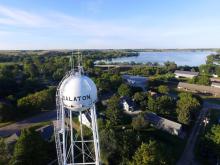At the State Level With Tony Neal-Graves in Colorado - Community Broadband Bits Podcast 312

The State of Colorado has made some changes in the past few years that are improving broadband deployment, especially in rural areas. In this episode of the podcast, Christopher talks about some of those changes with Tony Neal-Graves, Executive Director of the Colorado Broadband Office. While Christopher was in Vail at the Mountain Connect event, he and Tony sat down to have a conversation about broadband and deployment in Colorado.
In addition to discussing his shift from the private to public sector, Tony gets into changes in state law, including last session’s adjustments to Colorado’s right of first refusal. Tony describes what kinds of conversations he's had with local communities and acknowledges that Colorado communities are especially good at working together to solve connectivity issues. Chris and Tony also talk about the growing role of cooperatives and state versus FCC data collection. In addition to the Colorado Department of Local Affairs (DOLA), which helps fund local broadband deployment, Colorado seems to be making some smart moves that keep raising the bar on how to fast-track smart broadband deployment.
This show is 28 minutes long and can be played on this page or via Apple Podcasts or the tool of your choice using this feed.
Transcript below.
We want your feedback and suggestions for the show-please e-mail us or leave a comment below.
Listen to other episodes here or view all episodes in our index. See other podcasts from the Institute for Local Self-Reliance here.
Thanks to Arne Huseby for the music. The song is Warm Duck Shuffle and is licensed under a Creative Commons Attribution (3.0) license.


